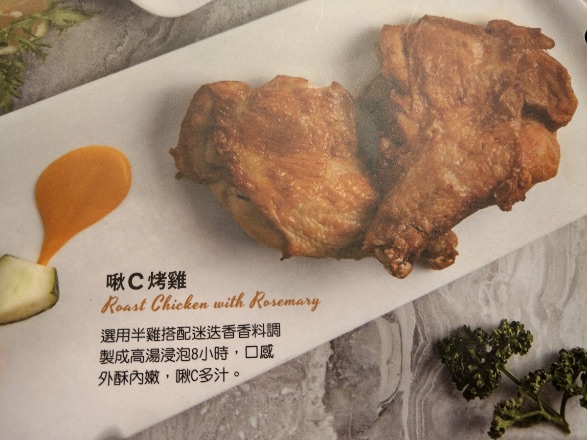Juicy chicken
« previous post | next post »
Mark Swofford sent this photograph of a dish on a menu in a Taiwanese restaurant chain:
The Chinese name of the dish is:
jiūC kǎojī
啾C烤雞
"juicy roast chicken"
Nothing to do with "rosemary", which is in the English name of the dish.
Normally, in Chinese texts, jiū 啾 is an onomatopoetic expression, often in reduplicated form (jiūjiū 啾啾), for the wailing of a child or the chirping of birds, insects, etc. Here, though, it is being used strictly to transcribe the sound of the first syllable of the English word "juicy".
The "C" following 啾 is used for the second syllable of "juicy".
Since kǎo G 烤G is a fairly common way to write kǎojī 烤雞 ("roast chicken") in Taiwan, I think they could have written jiū C kǎo G 啾C烤G for "juicy roast chicken".
Mark further remarks that apparently this "jiūC 啾C" ("juicy") usage is something that has been around for a little while, such as in this story about "Juicy lips" (JiūC chún 啾C唇) lip glaze from March 2015.
Extended uses of "juicy" from Grace Wu:
There is also a beverage chain store “JiūC xiān guǒzhī 啾C鮮果汁” ("Juicy Fresh Fruit Juice)" in Changhua.
Observations by Melvin Lee:
I do have a couple of thoughts about your suggestion for writing "jiū C kǎo G 啾C烤G" for "juicy roast chicken". First, we do use 烤G for 烤雞, but for terms which play with sounds like that, there is usually only one letter used per term. Since they used 啾C for juicy already, it's understandable that they didn't use 烤G for 烤雞. Second, I found it interesting because this ad must be targeting customers with better socio-economic background and better usage of the English language. While it's easy to associate 烤G with 烤雞, it's not easy to think of "juicy" when most Taiwanese see the term 啾C. Also, most Taiwanese may know the word "juice" from orange juice or apple juice, but not know the adjective "juicy" which can be used to describe meat, such as roasted chicken in this case. I am pretty sure that 啾C烤雞 is popular among the younger generation and people who are familiar with Western cuisine and culture.
For a different use of "C", see "Obama, Bush, vitamin drinks, and puns", Pinyin News (5/29/09), where "Bù C, bù C 不C,不C" means both "Not [just vitamin] C, not [just vitamin] C" and punningly "[George W.] Bushi, [George W.] Bushi".
Selected reading
- "A New Morpheme in Mandarin" (4/26/11)
- "Is Q a Chinese Character?" (4/15/10)

Philip Taylor said,
December 22, 2020 @ 1:48 pm
I am interested in Grace Wu's «[t]here is also a beverage chain store “JiūC xiān guǒzhī 啾C鮮果汁”». From Grace's surname, and from the fact that she is knowledgeable about such things, I assume that she is a Chinese resident — do native Chinese speakers routinely refer to drinks as beverages (something that to my ear sounds overly formal), or is there a subtle distinction between "drinks" and "beverages" of which I am unaware ?
JB said,
December 22, 2020 @ 7:22 pm
On a related note, there is a brand of women's sports clothing called Juicy, which one sees around in Asia, the brand name being prominently emblazoned, such as : https://i.pinimg.com/originals/bc/52/21/bc5221a04510203231479df099e19b96.jpg
and https://images.bubbleroom.eu/data/product/1000w/juicy-couture-tina-velour-track-pants-black_4.jpg
Josh R. said,
December 22, 2020 @ 7:44 pm
In American English, at least, I think "beverage" is more of a technical register than a formal one. The prototypical example is the phrase "food and beverage service." Similar to the distinction between "car" and "automobile." So to me, an American, Grace's use of "beverage" here is normal, and I would imagine she is either an American, or has learned American English to near-native level.
Victor Mair said,
December 22, 2020 @ 8:28 pm
@Josh R.
You are exactly right.
Grace comes from Taiwan, but she has been living and teaching (Mandarin and Taiwanese) in America for about four decades, and she has near-native fluency in American English.
BTW, her father was a famous language specialist on Taiwanese in Taiwan, and — when the pandemic is not afflicting us — she goes back to Taiwan every summer for a couple of months.
Philip Taylor said,
December 23, 2020 @ 3:05 am
Ah, so 'beverage' is American English, not Chinese English — I did not know that, nor did I think of it as a possible explanation. Thank you both.
Luke said,
December 23, 2020 @ 5:04 pm
I find it interesting that jiū is used to transcribe the first syllable of 'juicy' when jiū is a contraction of jioū. My guess is that it's closer to the English /d͡ʒɪʊ̯/ in Min Nan/Taiwanese Mandarin.
Terry Hunt said,
December 24, 2020 @ 9:14 am
@ Philip Taylor: as a Brit with some peripheral connections to the beer trade, I can attest that "beverage" is
standard industrial/commercial usage in the UK as well.
Rodger C said,
December 24, 2020 @ 11:07 am
I think that in America, "beverage" is motivated by the fact that "drink" as a noun tends to imply alcohol. But I associate it with commercial English.